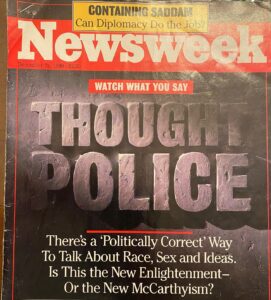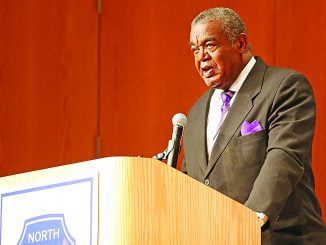
The following is the fourth of four installments that mark the low points in the Big Four universities tacking left
The cover of Newsweek’s Dec. 24, 1990, issue spelled out THOUGHT POLICE in tall letters, chiseled in stone, under the heading, “Watch What You Say.” The cover story noted that under “PC tyranny,” free speech is always the first casualty when “campus radicals” declare war on “social injustice.”
Thirty years later, the demise of free speech is the recurring theme in my study of North Carolina’s Big Four universities.
Coming last in this series is Wake Forest, whose leftward drift rarely made news before Wake Forest alum Melissa Harris-Perry joined the faculty in 2014. Dr. Harris-Perry had been a familiar face on MSNBC — until she publicly accused the network of treating her like a “token, mammy, or little brown bobble head” and was let go in 2016.
Nor has Wake Forest treated Harris-Perry with the deference she requires, so her tenure there has been “a drawn-out series of battles,” according to the Wake Forest Review. She has complained loudly about the university’s having “benefited from slavery and Jim Crow” and from its ties to a “racist” tobacco company. When the provost failed to respond with a plan to atone for Wake Forest’s tainted past, Harris-Perry went on record declaring, “Academic freedom is truly dead at Wake Forest.”
Perhaps there is no connection between her arrival at Wake Forest and the advent of the university’s “Bias Response Team,” but under the direction of the Office of Diversity and Inclusion, students are urged to report incidents of bias, “even if you’re not sure that what you witnessed or experienced was bias-related.”
One such incident made national news in 2018 because it involved the Response Team’s decision not to penalize students who repeatedly mocked a classmate for being a “mayonnaise monster lookin a**” and for participating in an event sponsored by the College Republicans. To her credit, Harris-Perry encouraged the student to report incidents of “verbal abuse,” but there is no record of her having pressed for a fair enforcement of the Response Team’s rules.
Nor is there a record of Harris-Perry’s having helped President Nathan Hatch design the plan he announced on July 31. The “President’s Commission on Race, Equity and Community” will “illuminate our history” and be “honest about its past… facing reality, however sobering.” Though she wasn’t assigned a position on the team Hatch assembled to implement his plan, Harris-Perry’s moment has come at last.
This column has already covered Wake Forest’s other news-making skirmish, which involved not one, but 189, faculty militants. Their target was the Eudaimonia Institute, which had accepted a $3.7 million donation from the Koch Foundation to support scholars who’d come together to “explore complex issues” and “engage in research.”
90% of a university’s national ranking score is based on ‘academic resources, graduate student debt, the diversity of the faculty and the salary of graduates’ while only 10% is based on the area that needs reform most — ‘the learning environment.’
From 2016 through 2019, it looked as though the Eudaimonia Institute would survive the militants’ push to cancel it. No more, and the institute will most likely disband at the end of this year.
Thus far, grantors, taxpayers and tuition-paying parents seem unfazed by the rise of cancel culture and the demise of free speech in our universities. Perhaps the Big Four’s patrons have overlooked reports involving students who are afraid to speak out in class, or perhaps some are in thrall to ideologues who promise to invent a world order that’s devoid of injustice and inequality.
Another likely reason, however, concerns the Big Four’s rankings among American universities. The Wall Street Journal’s September report places Duke at #5, Carolina at #33, Wake Forest at #64, and NC State at #112 — out of 500 institutions that made the cut. For some, a university’s high ranking is reason enough to ignore its critics, but I urge patrons to consider that 90% of a university’s national ranking score is based on “academic resources, graduate student debt, the diversity of the faculty and the salary of graduates” while only 10% is based on the area that needs reform most — “the learning environment.”
Having sustained impressive rankings among American universities and having surrounded themselves with like-minded leftists, the Big Four’s power brokers are free to indulge their love affair with the concepts “inclusion” and “diversity,” except, of course, when it comes to viewpoint diversity.
With universities hustling to recover revenue lost during the pandemic, perhaps it is time for our legislature to make funding contingent upon posted plans to allow viewpoint diversity in North Carolina’s universities. Or, as commentator Candace Owens has suggested, perhaps it’s time for university patrons to “defund the thought police” and to reinstate the First Amendment in American universities.
It was E.B. White who said, “One need only watch totalitarians at work to see that once men gain power over other men’s minds, that power is never used sparingly and wisely, but lavishly and brutally and with unspeakable results.”
It was Michael Skube who observed the unspeakable results that followed the first hostile takeover of a North Carolina university. After surveying the wreckage campus radicalas had wrought at NC State, Skube predicted — with heartbreaking accuracy — “the research goes on, and as it does the wealthiest nation on earth slowly becomes uneducated.”



